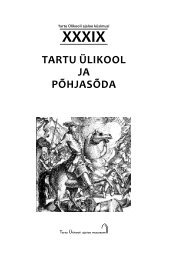TarTu ÜlIkool ja Põhjasõda - Tartu Ülikooli Ajaloo Muuseum
TarTu ÜlIkool ja Põhjasõda - Tartu Ülikooli Ajaloo Muuseum
TarTu ÜlIkool ja Põhjasõda - Tartu Ülikooli Ajaloo Muuseum
Create successful ePaper yourself
Turn your PDF publications into a flip-book with our unique Google optimized e-Paper software.
kaPituLatSioon Ja univerSitaS<br />
Capitulation and Universitas<br />
PhD SIRJE TAMUL<br />
Institute of History and Archaeology of the University of <strong>Tartu</strong><br />
While most of the institutions founded in the Modern Age are now<br />
gone, one is persevering with prominence – universitas The professors<br />
and the students are doing what their predecessors always did:<br />
teaching and learning, irrespective of wars and capitulations Capitulation<br />
and universitas, the two terms used in association refer to<br />
continuity of the university, new opportunities and modernisation<br />
– or chaos and decline<br />
Academia Gustaviana, the university founded in <strong>Tartu</strong> in 1632,<br />
was a typical Western European university and a product of warfare<br />
of that period The university foundation document received the<br />
royal blessing at a military camp in the vicinity of Nuremberg The<br />
university privilege included the provision that it was to be evacuated<br />
in the event of war and the privilege would not be lost as a result<br />
of the evacuation Throughout its existence, the academy from <strong>Tartu</strong><br />
had to reckon with military threats and likelihood of closure or<br />
evacuation In August 1699 the war indeed approached too close for<br />
comfort and Academia Gustavo-Carolina was relocated to the seaport<br />
town of Pärnu<br />
On 4 July 1710 the Livonian Knighthood and the City of Riga<br />
officially capitulated to Russian Field Marshal Count Boris Sheremetev<br />
On 12 August of the same year it was the university town<br />
of Pärnu’s turn to capitulate and it was stipulated that all those<br />
associated with the academy, including professors, their household<br />
members, widows, orphans and other persons, had the right to leave<br />
town with their movable property, without being searched This represented<br />
adherence to the custom of respecting the personal liberty<br />
of academic people, originating from the early Modern Age, i e their<br />
right to continue their scholarly pursuits freely and safely (basically<br />
defying danger) even in military conflicts and along with their entourage<br />
The university thus departed and the future of Livonia was<br />
unclear but the university idea stayed in Livonia The Swedish-period<br />
academy in Livonia was a classical four-faculty university with<br />
141



